|
|
|
Sort Order |
|
|
|
Items / Page
|
|
|
|
|
|
|
| Srl | Item |
| 1 |
ID:
132332
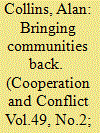

|
|
|
|
|
| Publication |
2014.
|
| Summary/Abstract |
The Association of Southeast Asian Nations (ASEAN) is building a people-oriented community in Southeast Asia and it has all the hallmarks of a Deutschian security community, with its emphasis on people-to-people contact and the involvement of civil society organisations in the community's creation. In this article the argument is made that it is precisely the involvement of the masses that creates the peace inertia associated with security communities, and thus ASEAN's plural turn is an essential first step in making ASEAN's community a security community. Whether ASEAN can actually do this, and indeed whether the membership are united in this objective, is not the focus for this article. Instead, and contrary to the security community literature, which identifies ASEAN as a non-liberal security community and has emphasised the practice of self-restraint, this article argues that past ASEAN practice has prevented a security community forming in Southeast Asia, and using self-restraint as an explanation for why security communities create dependable expectations of peaceful change for members has resulted in the agency of 'community' being neglected. Hence, this article argues for the need to bring 'community' back.
|
|
|
|
|
|
|
|
|
|
|
|
|
|
|
|
| 2 |
ID:
076725
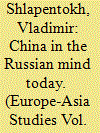

|
|
|
|
|
| Publication |
2007.
|
| Summary/Abstract |
This article describes the ambivalence of Russian attitudes toward China at the beginning of the twenty-first century. Russians of all strata combine a willingness to see China as a friendly neighbour with a high level of fear of the giant that could swallow much of the country whole, especially the Asian part. The article pays special attention to the split in Russian views of China among elites. While some elites, who have strong anti-American attitudes, see China as a major ally against the United States, others call on the government to treat the United States as the single force that can help Russia protect the integrity of its territory against China, whose people still do not recognise the existing borders between the two countries.
|
|
|
|
|
|
|
|
|
|
|
|
|
|
|
|
| 3 |
ID:
133784
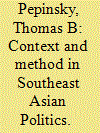

|
|
|
|
|
| Publication |
2014.
|
| Summary/Abstract |
This essay introduces and evaluates a central debate about context sensitivity in Southeast Asian political studies. Within this diverse field, there is no agreement about what context means, or how to be sensitive to it. I develop the idea of unit context (traditionally, the area studies concern) and population context (traditionally, the comparative politics concern) as parallel organizing principles in Southeast Asian political studies. The unit context/population context distinction does not track the now-familiar debates of qualitative versus quantitative analysis, nor debates about positivist epistemology and its interpretivist alternatives, nor even political science versus area studies. Context is not method, nor epistemology, nor discipline. Rather, the core distinction between unit-focused and population-focused research lies in assumptions about the possibility of comparison, or what methodologists call unit homogeneity. While I conclude on an optimistic note that a diverse Southeast Asian political studies (embracing many disciplines and many methodologies) is possible, the fact remains that unit context and population context are fundamentally incommensurate as frameworks for approaching Southeast Asian politics, and that population context is the superior approach.
|
|
|
|
|
|
|
|
|
|
|
|
|
|
|
|
| 4 |
ID:
131387
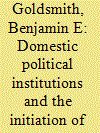

|
|
|
|
|
| Publication |
2014.
|
| Summary/Abstract |
There is doubt about whether the 'democratic peace' proposition applies in Asia. I theoretically deconstruct regime type into institutional components including political competition, constraint on the executive, and mass participation, and ask whether taking these as distinct causal factors gives more empirical purchase on the relationship of domestic political institutions to states' external conflict behavior. I find that higher levels of political competition are associated with a lower likelihood of conflict initiation, but only when the potential target is relatively democratic. Thus, my directed-dyad analysis is consistent with a democratic peace effect in East Asia. It is also suggestive regarding the observed 'East Asian peace' that has existed since 1979, because levels of political competition have risen considerably in the region, beginning in the late 1970s.
|
|
|
|
|
|
|
|
|
|
|
|
|
|
|
|
| 5 |
ID:
133964
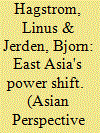

|
|
|
|
|
| Publication |
2014.
|
| Summary/Abstract |
The widespread debate on an East Asian power shift is generally based on the crude notion that power and capability are interchangeable. We critique this view and offer the alternative that power is the capacity of actors and discourses to produce effects- what we call relational and productive power, respectively. We also engage in a reflexive exercise by addressing the productive power of the power-shift debate itself, and emphasize the danger that this debate might enable the kind of realpolitik that it forebodes.
|
|
|
|
|
|
|
|
|
|
|
|
|
|
|
|
| 6 |
ID:
167849
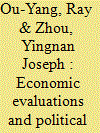

|
|
|
|
|
| Summary/Abstract |
The economic voting literature argues that economics matters to democratic leaders. We argue that it matters to authoritarian leaders, too, and its influence is stronger there than it is in democratic countries. Using data on four Asian countries from the Asian Barometer Survey, we find substantial support for our theory.
|
|
|
|
|
|
|
|
|
|
|
|
|
|
|
|
| 7 |
ID:
090843
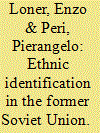

|
|
|
|
|
| Publication |
2009.
|
| Summary/Abstract |
The article seeks to 'measure' the concept of 'identification as titular' in regard to the members of five ethnic groups in the former Soviet Union (Bashkirs, Karels, Komis, Tatars and Yakuts) and the factors which strengthen, or conversely weaken, such identification. In order to do this it uses multigroup confirmatory factor analysis and multigroup structural equation modelling. Identification is mainly associated with a sense of national superiority and duration of residence in the home republic. The pattern among Yakuts, however, differs from that of the other ethnic groups and would require further detailed analysis.
|
|
|
|
|
|
|
|
|
|
|
|
|
|
|
|
| 8 |
ID:
182523
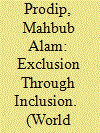

|
|
|
|
|
| Summary/Abstract |
This comparative case study uses qualitative data to explore and analyze the institutional obstacles that women in reserved seats face to their political empowerment in the Gram Panchayat in India and the Union Parishad in Bangladesh. The findings reveal that women in reserved seats in both countries confront some fundamental institutional barriers, such as a masculine model of politics, lack of political party support, as well as lack of power and resources. Indian women face serious problems—the inclusion of ex-officio members, the rotational system, bureaucratic dominance, and partisan elections—whereas Bangladeshi women suffer from the unequal distribution of reserved seats under a quota policy and lack of clarity in rules, power, and provisions. A lack of financial resources limits the effective participation of women members in the decision-making process in both countries. Further institutional reforms are vital to ensure women’s political empowerment through reserved seats in both countries.
|
|
|
|
|
|
|
|
|
|
|
|
|
|
|
|
| 9 |
ID:
135813
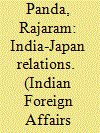

|
|
|
|
|
| Summary/Abstract |
India and Japan are both important players in Asian political scene. During the cold war era, ideological difference and alignment perhaps prevented both countries from closely honing their economic and strategic complementarities. After India liberalized its economic policies in the early 1990s, this equation changed noticeably, and moved towards a stronger relationship in economic and strategic domains. through the growth momentum was not at the desired level-as compared to India’s economic engagement with, for example, China, South Korea and Australia- recent political changes in both the countries is expected to pave the way towards greater cooperation. Moreover, the strategic factor seems to have emerged as the prime driver in the bilateral ties between the two countries.
|
|
|
|
|
|
|
|
|
|
|
|
|
|
|
|
| 10 |
ID:
187727
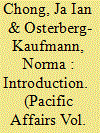

|
|
|
|
|
| Summary/Abstract |
A growing global trend towards authoritarianism has left democracy, especially its liberal form, under strain. This has occurred despite earlier promises of democratization between the end of the Cold War and the early twenty-first century. Our essay examines how the dynamics of post-democratization politics have played out across several polities in Southeast and Northeast Asia. These regions once included supposed “third wave” democracies and polities apparently on the cusp of political liberalization. Such expectations have not panned out. Instead, the region has generally witnessed either significant authoritarian resilience or autocratic resurgence following spurts of political openness. We examine how such autocratic dynamics have played out following earlier movements toward democratization. Specifically, we identify three key elements of post-democratization politics associated with autocratic success and democratic robustness based on contributions to this special issue, and suggest pathways through which they can affect political outcomes.
|
|
|
|
|
|
|
|
|
|
|
|
|
|
|
|
| 11 |
ID:
124281
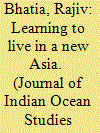

|
|
|
|
|
| Publication |
2013.
|
| Summary/Abstract |
Instead of including in aggressive posturing, leaders of the region must recognize shifting dynamics and strengthen the East Asia summit as the mechanism to resolve differences.
|
|
|
|
|
|
|
|
|
|
|
|
|
|
|
|
| 12 |
ID:
029077
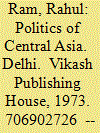

|
|
|
|
|
| Publication |
DelhI, Vikash Publishing House, 1973.
|
| Description |
vii, 185p.Hbk
|
| Contents |
Includes index.
|
| Standard Number |
706902726
|
|
|
|
|
|
|
|
|
|
|
|
Copies: C:1/I:0,R:0,Q:0
Circulation
| Accession# | Call# | Current Location | Status | Policy | Location |
| 011370 | 320.958/RAM 011370 | Main | On Shelf | General | |
|
|
|
|
| 13 |
ID:
033774
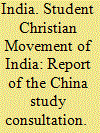

|
|
|
|
|
| Publication |
United Theological College, 1969.
|
| Description |
140phbk
|
|
|
|
|
|
|
|
|
|
|
|
Copies: C:1/I:0,R:1,Q:0
Circulation
| Accession# | Call# | Current Location | Status | Policy | Location |
| 005596 | 951.03630344/ IND 005596 | Main | On Shelf | Reference books | |
|
|
|
|
| 14 |
ID:
132776
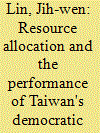

|
|
|
|
|
| Publication |
2014.
|
| Summary/Abstract |
Politics always involves the exchange of resources for votes, but the mechanism differs according to the electoral institution. The principal-agent model identifies two necessary conditions for this exchange to be feasible: (1) the opportunity cost of preferential grants is small, and (2) agents receiving these resources play a vital role in helping the principal to win. These conditions were satisfied in the presidential election of 2004, when swing voters were critical in helping the Democratic Progressive Party (DPP) to retain the presidency and limited costs were attached to the resources demanded by legislators elected under the single non-transferable vole (SNTV) system. After 2004, the president no longer exchanged grants for votes at the national level because swing voters could hardly change the result of presidential elections while the opportunity cost of grants was raised by the plurality-tier of the mixed-member majoritarian (MMM) system. Nevertheless, resource allocation still dominates local politics. After MMM was introduced, DPP legislators elected in DPP-led regions distributed the resources that were helpful to consolidating potential supporters; those campaigning in KMT-administered areas, however, attempted to lure swing voters by providing them with extra services-just like what their local heads did.
|
|
|
|
|
|
|
|
|
|
|
|
|
|
|
|
| 15 |
ID:
053662
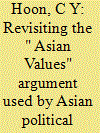

|
|
|
| 16 |
ID:
128948
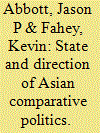

|
|
|
|
|
| Publication |
2014.
|
| Summary/Abstract |
In this article we explore the state of the discipline of comparative Asian politics. In particular we analyze five aspects of research on Asia: whether the empirical scope of research is largely noncomparative; the extent to which that research is empirical rather than theory-generative; whether it pertains to public or foreign policy; if it relies on qualitative rather than quantitative methods; and the gender and geographic concentration of those conducting the research. After coding and analyzing data from 461 articles from eight different journals, we demonstrate that research on comparative Asian politics is more likely to be empirical, qualitative, focused on the country as unit of analysis, and disproportionately written by male academics educated and/or working in North America, Western Europe, or Australia.
|
|
|
|
|
|
|
|
|
|
|
|
|
|
|
|
|
|
|
|
|